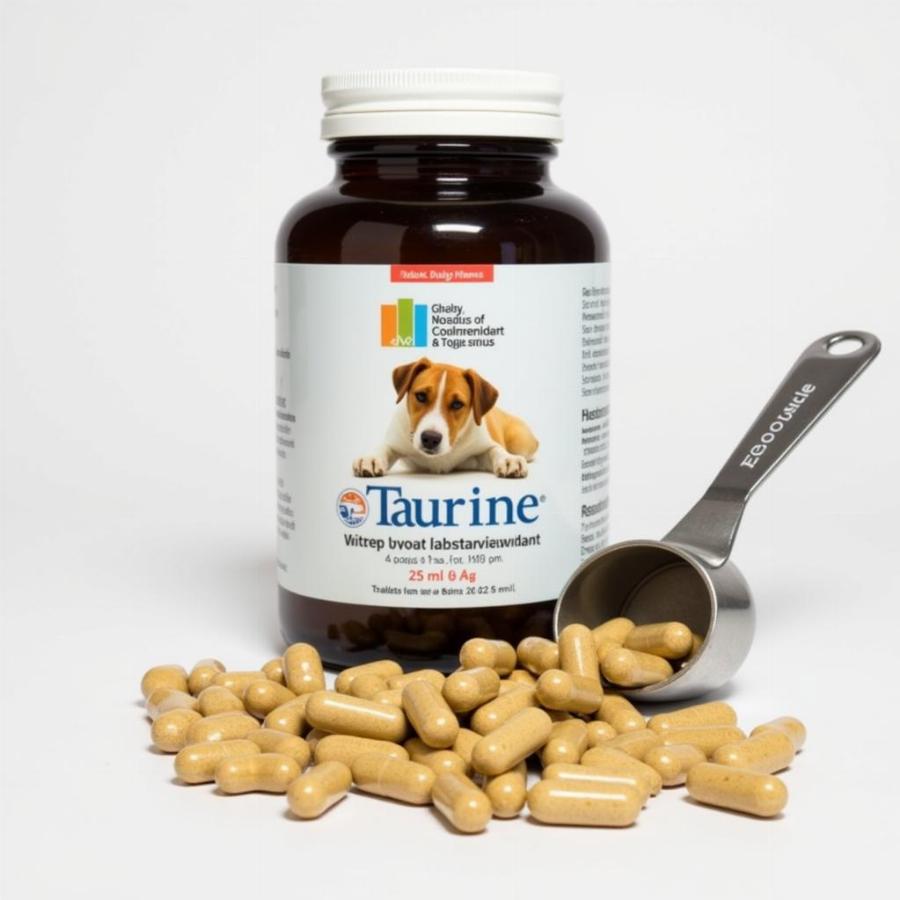Taurine, often mentioned in discussions about dog food, is an amino acid crucial for canine health. Understanding the role of dog supplement taurine, when it’s needed, and how to choose the right supplement can significantly impact your furry friend’s well-being. This article delves into the importance of taurine for dogs, potential deficiencies, and the benefits and risks of taurine supplementation.
What is Taurine and Why Do Dogs Need It?
Taurine is a conditionally essential amino acid, meaning dogs can typically produce it themselves under normal circumstances. However, certain breeds and individual dogs might require dog supplement taurine due to genetic predispositions or dietary factors. Taurine plays a vital role in various bodily functions, including heart health, vision, digestion, and immune system function.
Taurine Deficiency in Dogs: Signs and Causes
While less common than in cats, taurine deficiency in dogs can lead to serious health issues, especially dilated cardiomyopathy (DCM), a form of heart disease. Other symptoms might include vision problems, digestive upset, and reproductive issues. Certain breeds like Golden Retrievers, Cocker Spaniels, and Newfoundlands are genetically predisposed to taurine deficiency. Diets lacking sufficient animal-based protein or containing certain ingredients that interfere with taurine absorption can also contribute to deficiency.
Benefits of Dog Supplement Taurine
Supplementing with taurine can be beneficial for dogs diagnosed with taurine deficiency or at risk of developing it. It supports heart health, improves vision, aids digestion, and boosts the immune system. In dogs with DCM, taurine supplementation can improve heart function and prolong lifespan.
How to Choose the Right Dog Supplement Taurine
When choosing a dog supplement taurine, opt for high-quality products from reputable brands. Consult your veterinarian to determine the appropriate dosage based on your dog’s breed, size, age, and health condition. Avoid supplements with unnecessary additives or fillers.
Risks of Taurine Supplementation in Dogs
While taurine is generally safe, excessive supplementation can potentially lead to digestive upset, including diarrhea and vomiting. It’s important to follow your veterinarian’s recommended dosage and monitor your dog for any adverse reactions.
Taurine in Dog Food: Natural Sources and Supplementation
Many commercial dog foods are fortified with taurine, especially those formulated for specific breeds prone to deficiency. Natural sources of taurine include meat, poultry, fish, and shellfish. Is beef heart good for dogs? Yes, it’s a great source of taurine. If you’re feeding a homemade or vegetarian diet, consult a veterinary nutritionist to ensure your dog receives adequate taurine. Vegetarian dog food recipe might need taurine supplementation. Plant based dog food also needs careful consideration regarding taurine levels.
FAQs about Dog Supplement Taurine
What are the signs of taurine deficiency in dogs? Signs can include lethargy, weakness, vision problems, and dilated cardiomyopathy (DCM).
How much taurine should I give my dog? Always consult with your veterinarian to determine the correct dosage for your dog.
Can I give my dog human taurine supplements? It’s best to use taurine supplements specifically formulated for dogs.
Are there any side effects of taurine supplementation? While generally safe, excessive taurine can lead to digestive upset.
Is taurine essential for all dogs? While conditionally essential, certain breeds and individual dogs require supplementation.
 Viên Uống Bổ Sung Taurine Cho Chó
Viên Uống Bổ Sung Taurine Cho Chó
What if My Dog Doesn’t Like Taurine Supplements?
If your dog refuses to take taurine supplements, try mixing them with a small amount of their favorite food or using a pill pocketer. Taurine supplements for dogs can be administered in various forms. You can also consider adding organ meat for dogs to their diet, under your vet’s supervision, as a natural source of taurine.
Conclusion
Dog supplement taurine plays a crucial role in maintaining your canine companion’s health, especially for certain breeds prone to deficiency. Understanding the signs of deficiency, benefits of supplementation, and how to choose the right product is essential for responsible dog ownership. Always consult your veterinarian before starting any new supplements to ensure your dog receives the appropriate care tailored to their individual needs.
Beaut Dogs is your go-to resource for all things related to canine companions, offering expert advice and guidance on dog care. From breed selection to nutrition and health, Beaut Dogs provides comprehensive information to help you become the best pet parent. When in need of personalized advice, contact us at Email: [email protected] to receive detailed and accurate support from Beaut Dogs.